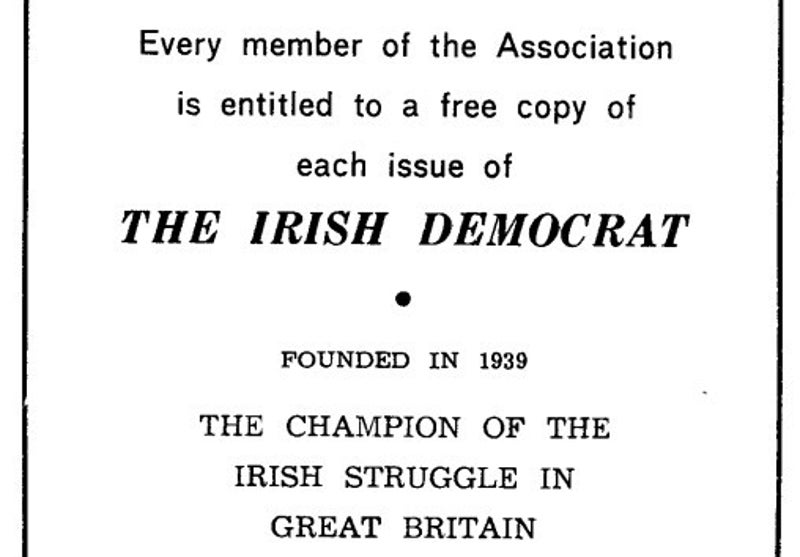The Connolly Association

The Connolly Association was established in 1938 among Irish socialists in Britain. Campaigning mainly through the trade union movement, the Connolly Association aimed both to promote the interests of Irish workers in Britain, and to seek Irish reunification. Its founding watchword implored the Irish in Britain to establish class unity for the cause of labour and of the Irish republic. The Connolly Association’s founding cohort included former International Brigadiers who had fought for the republic in the Spanish Civil War: one of the Association’s first campaigns was to demand that General Franco’s fascist regime release Frank Ryan. By 1940, it had branches in London, Wealdstone, Wellingborough, Manchester, Liverpool, Birmingham, Newcastle, Glasgow, Coatbridge, and Portsmouth. The Birkenhead-born Communist Party activist and historian C. Desmond Greaves joined the Association the following year, and proceeded to become its leading activist, serving until his death in 1988.
The Association’s constitution of 1955 stipulated that it would not align formally with any political party. Published in 1961, Greaves’s biography of the republican socialist James Connolly illustrated the ideological foundations of the Association’s strategy: for Greaves, Connolly’s crucial contribution to revolutionary history was his assertion that working-class liberation was indivisible from the national struggle. Greaves further underlined Connolly’s injunction that Irish radicals in Britain must strive to forge alliances with all pro-republican sections of the British body politic.
The Association campaigned vociferously during the 1960s to raise in Britain the issue of civil rights in Northern Ireland, writing to Prime Minister Harold Wilson to that effect in July 1968. At a time when British MPs declined, by convention, to discuss Northern Ireland affairs at Westminster, the Connolly Association persistently pressured parliamentarians – especially those in Harold Wilson’s Labour government – to intervene in Northern Ireland and to force reforms upon Stormont Prime Minister Terence O’Neill. The Association’s leading light, the communist historian C. Desmond Greaves, based their position on Section 75 of the Government of Ireland Act, which had reserved to the Westminster parliament control over Northern Ireland.


In 1969, when Lord Fenner Brockway proposed a Bill of Rights to establish equal civil rights in Northern Ireland, the Connolly Association petitioned sympathetic MPs, such as the member for Manchester Blackley, Paul Rose, to lend their support too.
But the Connolly Association did not advocate such reforms as ends in themselves. On the contrary, establishing civil rights, they argued, would stimulate class unity across the sectarian divide, and pave the way for Irish reunification. Establishing equal rights of voting, housing, and employment in Northern Ireland, the group’s newspaper postulated in 1969, would ‘open the road to the ending of partition’.

After the conflict erupted in Northern Ireland at the turn of the 1970s, the Connolly Association consistently demanded a programme of reforms and a Bill of Rights to establish parity between working-class Protestants and Catholics. Activists like C. Desmond Greaves envisioned such equity as the precursor to a united class struggle for Irish independence.
Reviewing the Association’s career almost half a century since its foundation, Greaves told a conference in London in 1985 that the Connolly Association was ‘the oldest Irish organisation in Britain’ and ‘the only one that has always approached the Irish question from the standpoint of internationalism… it holds that it is the international duty of English Labour to work for Irish independence’.
After the conflict erupted in Northern Ireland at the turn of the 1970s, the Connolly Association consistently demanded a programme of reforms and a Bill of Rights to establish parity between working-class Protestants and Catholics. Activists like C. Desmond Greaves envisioned such equity as the precursor to a united class struggle for Irish independence.
Reviewing the Association’s career almost half a century since its foundation, Greaves told a conference in London in 1985 that the Connolly Association was ‘the oldest Irish organisation in Britain’ and ‘the only one that has always approached the Irish question from the standpoint of internationalism… it holds that it is the international duty of English Labour to work for Irish independence’.

Create Your Own Website With Webador